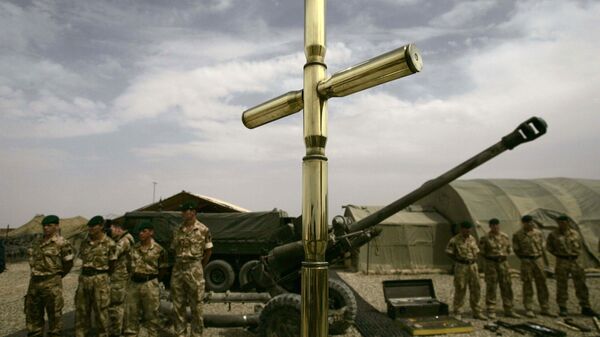Under new government proposals announced Tuesday, October 4, at the Conservative Party conference in Birmingham, the British government would disconnect itself from the European Convention of Human Rights (ECHR) during future conflicts.
It is a move the court does allow for, but is still considered deeply contentious.
Prime Minister May has justified the "opt-out" by pointing to the growing list of UK soldiers who have faced — and continue to face — legal challenges brought against them. May claims that UK taxpayers will also be better off.
"Our armed forces are the best in the world and the men and women who serve make huge sacrifices to keep us safe. We will repay them with gratitude and put an end to the industry of vexatious claims that has pursued those who served in previous conflicts," Mrs. May said.
However, many lawyers, and some family members of British troops, are concerned that May's proposal would allow the government to cover up genuine allegations of wrongdoing and abuse.
Our armed forces do a hard & dangerous job, but that doesn't mean they are or should be above the law. #ECHR https://t.co/LdXZZCbl3P
— Amnesty UK (@AmnestyUK) October 4, 2016
Private Cheryl James was an 18-year-old army recruit when she was found dead at the Deepcut Barracks in Surrey in 1995. An army inquest, lasting just an hour, was dismissed by her family as a cover-up. They had to use the European Convention of Human Rights to push for a further inquest to uncover the truth.
"#ECHR is protection for military families seeking truth when Govt is trying to cover up its failings at any cost" https://t.co/HCzU8mLQZ8
— Liberty (@libertyhq) October 4, 2016
Her father Des James, told the Independent newspaper that he fears that other military families will not have access to the same support.
"The government has a short memory. It is ignoring the many servicemen and women and their families, like mine, who have used the ECHR to hold the Ministry of Defense to account when it has failed to meet the standards we rightly expect and deserve, often with shattering consequences."
He said the ECHR is an "essential protection for military families seeking the truth when the government is trying to cover up its failings at any cost."
The ECHR protects all people, including our armed forces https://t.co/HdK9V0gD8f
— The Law Society (@TheLawSociety) October 4, 2016
Yet, the prime minister does have the support of many other military families. There have been numerous examples of long-running legal cases that have turned out to be based on such "vexatious claims."
A notorious example was the Al-Sweady Public Inquiry. In 2014, the inquiry into allegations of murder and torture made against British soldiers by Iraqi detainees, was dismissed by the judge as "deliberate lies, reckless speculation and ingrained hostility".
Inquiry chairman Sir Thayne Forbes, said the "most serious allegations" that "have been hanging over these soldiers for the past 10 years" were "without foundation."
The five-year public inquiry cost the taxpayer US$39 million.
The UK Ministry of Defense (MoD) has spent more than $127 million on investigations, inquiries and compensation on the Iraq War alone, since 2004.
There are more than 600 allegations against UK soldiers. These include claims include those from a Taliban bomb maker who alleges that his detention for 106 days was illegal, despite troops' belief that he would make bombs designed to kill soldiers if released.
Prime Minister May, and some military campaigners, say that such claims are opportunistic and "spurious."
She also stressed that British troops will still be subject to international law, including the Geneva Convention, and will still be policed by the Royal Military Police.



